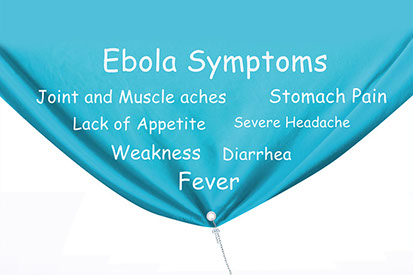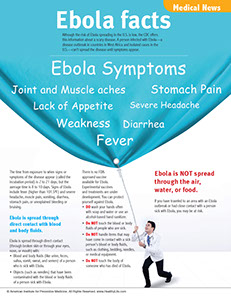MEDICAL NEWS
Ebola facts

Although the risk of Ebola spreading in the U.S. is low, the CDC offers this information about a scary disease. A person infected with Ebola—a disease outbreak in countries in West Africa and isolated cases in the U.S.—can’t spread the disease until symptoms appear.
The time from exposure to when signs or symptoms of the disease appear (called the incubation period) is 2 to 21 days, but the average time is 8 to 10 days. Signs of Ebola include fever (higher than 101.5ºF) and severe headache, muscle pain, vomiting, diarrhea, stomach pain, or unexplained bleeding or bruising.
Ebola is spread through direct contact with blood and body fluids.
Ebola is spread through direct contact (through broken skin or through your eyes, nose, or mouth) with:
• Blood and body fluids (like urine, feces, saliva, vomit, sweat, and semen) of a person who is sick with Ebola.
• Objects (such as needles) that have been contaminated with the blood or body fluids of a person sick with Ebola.
There is no FDA-approved vaccine available for Ebola. Experimental vaccines and treatments are under development. You can protect yourself against Ebola.
• DO wash your hands often with soap and water or use an alcohol-based hand sanitizer.
• Do NOT touch the blood or body fluids of people who are sick.
• Do NOT handle items that may have come in contact with a sick person’s blood or body fluids, such as clothing, bedding, needles, or medical equipment.
• Do NOT touch the body of someone who has died of Ebola.
Ebola is NOT spread through the air, water, or food.
If you have traveled to an area with an Ebola outbreak or had close contact with a person sick with Ebola, you may be at risk.

Download an offline pdf file.
MEDICAL NEWS ARTICLES
<
>
2021 © American Institute for Preventive Medicine - All Rights Reserved. Disclaimer | www.HealthyLife.com








